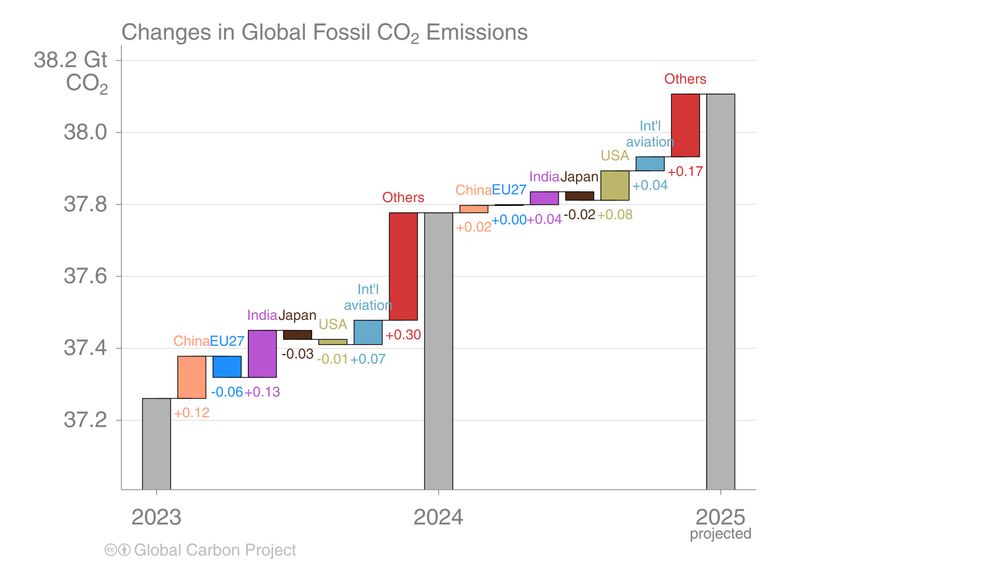
CICERO Center for International Climate Research, Oslo, Norway
https://cicero.oslo.no/en/employees/glen-peters

Fossil CO2 emissions continue to rise in 2025 while the terrestrial carbon sink recovers to pre-El Niño strength.
The key findings are covered in two reports this year:
* ESSDD (preprint): essd.copernicus.org/preprints/es...
* Nature: www.nature.com/articles/s41...
1/
I think it was a good idea to bring back. Let me explain why...
1/

I think it was a good idea to bring back. Let me explain why...
1/
"Well, no, because I work on this everyday".
Now I have found the surprise... Carbonation, the uptake of CO2 in cement, has turned a corner because cement production is dropping!

"Well, no, because I work on this everyday".
Now I have found the surprise... Carbonation, the uptake of CO2 in cement, has turned a corner because cement production is dropping!
If rich country GHG or CO2 emissions are not dropping at >5% per year, they are not remotely consistent with 1.5C, nor net zero in a reasonable time frame.
Scientists need to point this out.
If rich country GHG or CO2 emissions are not dropping at >5% per year, they are not remotely consistent with 1.5C, nor net zero in a reasonable time frame.
Scientists need to point this out.
While fossil CO2 emissions rise again and carbon sinks are weakened by climate change, deforestation emissions are down and many countries decarbonise their energy.
No global emissions peak yet though.
theconversation.com/the-worlds-c...

While fossil CO2 emissions rise again and carbon sinks are weakened by climate change, deforestation emissions are down and many countries decarbonise their energy.
No global emissions peak yet though.
theconversation.com/the-worlds-c...

www.carbonbrief.org/analysis-fos...
This year we had a rather big adjustment in land-use change emissions, including the change in carbon density due to CO2 fertilisation, etc.
rdcu.be/ePDDS

www.carbonbrief.org/analysis-fos...
This year we had a rather big adjustment in land-use change emissions, including the change in carbon density due to CO2 fertilisation, etc.
rdcu.be/ePDDS
Please take note of my wise words...
www.nature.com/articles/d41...

Please take note of my wise words...
www.nature.com/articles/d41...
@glenpeters.bsky.social
Listen now: overshootpod.com

@glenpeters.bsky.social
Listen now: overshootpod.com
www.axios.com/2025/11/13/c...

www.axios.com/2025/11/13/c...
Going to zero today will keep us <1.5°C
Constant emissions leads to 2.6°C, rising rapidly thereafter.
www.nature.com/articles/s41...

Going to zero today will keep us <1.5°C
Constant emissions leads to 2.6°C, rising rapidly thereafter.
www.nature.com/articles/s41...
Hør og lær:
www.energiogklima.no/podkast/stat...

Hør og lær:
www.energiogklima.no/podkast/stat...
Fossil CO2 emissions continue to rise in 2025 while the terrestrial carbon sink recovers to pre-El Niño strength.
The key findings are covered in two reports this year:
* ESSDD (preprint): essd.copernicus.org/preprints/es...
* Nature: www.nature.com/articles/s41...
1/

Fossil CO2 emissions continue to rise in 2025 while the terrestrial carbon sink recovers to pre-El Niño strength.
The key findings are covered in two reports this year:
* ESSDD (preprint): essd.copernicus.org/preprints/es...
* Nature: www.nature.com/articles/s41...
1/
essd.copernicus.org/preprints/es...

essd.copernicus.org/preprints/es...
Fossil CO2 emissions continue to rise in 2025 while the terrestrial carbon sink recovers to pre-El Niño strength.
The key findings are covered in two reports this year:
* ESSDD (preprint): essd.copernicus.org/preprints/es...
* Nature: www.nature.com/articles/s41...
1/

Let's have a look.
Figure: robbieandrew.github.io/GCB2025/
1/

Let's have a look.
Figure: robbieandrew.github.io/GCB2025/
1/
Each mCDR deployment aims to remove a tiny fraction of that, so if people think we have the methodology to do proper MRV for mCDR right now, they're delusional. 🌊

Each mCDR deployment aims to remove a tiny fraction of that, so if people think we have the methodology to do proper MRV for mCDR right now, they're delusional. 🌊

There are 35 economies where fossil CO2 emissions have declined in the last decade while growing their economies, even after accounting for variability.
theconversation.com/the-worlds-c...

There are 35 economies where fossil CO2 emissions have declined in the last decade while growing their economies, even after accounting for variability.
theconversation.com/the-worlds-c...
You will find the link here, under Press Conference 2, 10:00-10:30.
unfccc.int/cop30/meetin...

You will find the link here, under Press Conference 2, 10:00-10:30.
unfccc.int/cop30/meetin...
It lays out what we've avoided, what we've failed to avoid, and what's at stake if we let the future slip
We are not on a good trajectory, and slipping back into a worse trajectory is always possible. But: we know it bleeds

It lays out what we've avoided, what we've failed to avoid, and what's at stake if we let the future slip
We are not on a good trajectory, and slipping back into a worse trajectory is always possible. But: we know it bleeds
These 35 countries account for 27% of global fossil CO2 emissions.
5/


robbieandrew.github.io/GCB2025/

robbieandrew.github.io/GCB2025/
Fossil CO2 emissions continue to rise in 2025 while the terrestrial carbon sink recovers to pre-El Niño strength.
The key findings are covered in two reports this year:
* ESSDD (preprint): essd.copernicus.org/preprints/es...
* Nature: www.nature.com/articles/s41...
1/

Fossil CO2 emissions continue to rise in 2025 while the terrestrial carbon sink recovers to pre-El Niño strength.
The key findings are covered in two reports this year:
* ESSDD (preprint): essd.copernicus.org/preprints/es...
* Nature: www.nature.com/articles/s41...
1/
The current policy scenario tells us which assumptions lead to rising oil demand. Yes, many assumptions are unrealistic as Dave explains. Therefore we would not expect oil to rise to 2050.
FT headline is wrong, clearly.
What are the IEA assumptions that make rising oil demand so improbable?

The current policy scenario tells us which assumptions lead to rising oil demand. Yes, many assumptions are unrealistic as Dave explains. Therefore we would not expect oil to rise to 2050.
FT headline is wrong, clearly.

